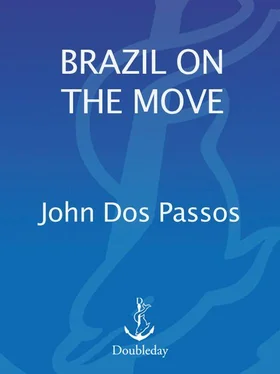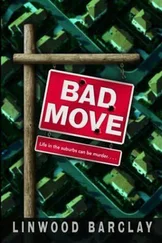To the amazement of friend and foe, Governor Lacerda, after a little preliminary fumbling, developed one of the most efficient administrations the city had ever seen. He collected about him a group of townplanners and architects and engineers and laid plans for new electric light plants, for a new water supply, for renovating the sewerage system and for dealing with a long list of what he called skeletons, projects started by previous administrations that had been halted for lack of funds. When the Alliance for Progress came along he eagerly took advantage of American money. He announced his administration’s aim to “make Rio once more the Marvelous City.”
“Oh, marvelous city,” went a popular song. “By day we lack water, and by night we lack light.”
It was at Jânio Quadros’ suggestion that Carlos Lacerda ran for the governorship of Guanabara. During the early months of Quadros’ presidency the two men continued to see eye to eye. Quadros’ first administrative reforms had Lacerda’s hearty approval. The governor’s plan was to keep pace in his local administration with the President’s reform of the federal government.
The trouble that began to develop between them stemmed from the fact that the problems Quadros had to meet at Brasília were much tougher than the problems he had coped with in São Paulo. There he had the advantage of able collaborators, since the city and state of São Paulo had for years enjoyed the most competent administration in Brazil. In São Paulo the new broom could be placed in the hands of men who knew how to use it.
In Brasília everything was chaotic. The capital city had been only recently inaugurated. More than half the government offices were still in Rio. Politicians, and particularly their wives and families, balked at exchanging the familiar amenities of the old capital for the windswept immensities of bare red clay and the dust of construction work of the fantastic new city on the plateau five hundred miles inland. Nie-meyer’s new congress building was striking to behold but inconvenient to operate. Even when the President could coax enough senators and deputies out to Brasília for a quorum he found it hard to keep their minds on constructive legislation. He was confronted by the fact that running a vast sprawling nation, where the problems of government were different in each different region, was a far more exacting task than acting the spellbinder as figurehead for that nation’s best organized state. Failure stared him in the face.
Lacerda now says that Jânio was a charlatan all along. He points out his slovenly working habits, his lack of education, that his only reading had been some Shakespeare and a little Zola. His taste in art Lacerda found atrocious. Though immensely clever at picking ideas out of other men’s mouths, Jânio, says Lacerda, always lacked the inner cohesion needed to face adversity. Still he can’t help admitting that at the time of Jânio’s inauguration, like millions of other Brazilians, he expected a miracle.
Unable to cope with the complications of reforming the federal government, Quadros began to listen to advisers who brought up the parallel of Fidel Castro in Cuba. Castro wasn’t plagued with a recalcitrant congress, with a faultfinding press or with powerful financial interests all tugging in different directions. Castro was having it all his own way. Instead of piecemeal reform, maybe Brazil needed a Castro-type revolution. Jânio’s gift for swaying the crowd was equal to Fidel’s. With dictatorial powers he could really use his new broom.
Quadros wanted Lacerda’s help in this half formulated enterprise. Members of his administration turned up in Rio, suggesting that Lacerda’s own work would be easier if the President and the state governors had more power. Lacerda’s answer was that Quadros had all the power he needed. He had the prestige. He had the backing of the whole population. What he must do was present an itemized program to congress. Popular clamor would do the rest.
Gradually it dawned on Lacerda that Quadros had no program to offer. He wanted power first. The program could wait. The newspapers were full of the handsome reception the President was giving to Fidel Castro’s mission to Brazil.
The old watchdog of democracy was aroused. He talked with other state governors and federal senators. He became convinced that something unhealthy was brewing at Brasília.
Although it was second nature to Lacerda to make his every thought public in his newspaper or on the air, he kept his doubts to himself until at last he could contain himself no longer; he must have it out with President Quadros.
Quadros was in Brasília. His wife, Dona Elvá de Quadros, whom Lacerda speaks of as a really nice sensible woman, was in Rio. Lacerda went to see her at the presidential residence and explained to her that he had to have a quiet talk with her husband. The answer was an invitation to dine that same night and the appearance of the President’s jet to transport Governor Lacerda to Brasília.
It was from the President’s military attaché, who met him at the airport, that Lacerda learned that Quadros had just given the most important Brazilian decoration to Castro’s chief assistant, “Ché” Guevara. The President’s household was caught by surprise.
Sensing that he was in for a rough time Lacerda sent his secretary to engage a room at the hotel and proceeded to the palace. There he was met by someone he described as “a sort of Gregório” who took his little black overnight case and showed him to a suite. The first sour note was that the President had already dined. Governor Lacerda dined alone.
Then President Quadros suddenly put in an appearance. He greeted Lacerda warmly and gave him a friendly hug. It was obvious that he had had a few drinks. Lacerda immediately started to tell him of his doubts and suspicions. He asked for an explanation. He said he didn’t want to go back to his days of wild attacks but he owed something to his voters and to the country. He explained that he couldn’t go along with Jânio’s pro-Castro foreign policy. Maybe he’d better resign as governor. The country had a right to a little peace and quiet.
He added that he had personal reasons too. When he took over the governorship he had turned his newspaper over to his son Sérgio. The boy was having a hard time. He didn’t want him to meet failure so young. Jânio gave Lacerda a sharp look and cried out that if it was money he needed for his newspaper he would attend to that.
Lacerda answered that he didn’t want money. His newspaper could take care of itself. He wanted some assurance that Jânio Quadros wasn’t trying to behave like Fidel Castro.
Quadros is a smallish man with a Charlie Chaplin mustache. Lacerda, who had always been on good terms with him, tried to kid him: Come now he wasn’t Charles de Gaulle.
“Let’s go to the movies,” said Jânio.
Seeing movies every night had become an obsession with him. The big hall in the palace was rigged up with a motion picture screen. There were tables piled with sausages and cold meats, bowls of popcorn, beer and whiskey bottles. Quadros had the reputation of having a good head for liquor, but by this time he was showing it.
They started with a serious picture but the President shouted that he wanted something funny. He called for Jerry Lewis. He didn’t like Jerry Lewis and switched to a Western. He was a great fan of Westerns.
In the middle of the reel the President went to the phone. He came back and told Lacerda he wanted him to confer with two of his ministers who were having a private talk in a room at the hotel.
When Lacerda reached the hotel all the ministers would talk about was some articles Lacerda had written in the period after Vargas’ suicide, suggesting that elections be postponed. Why didn’t he favor direct action now? Lacerda told them that the situation today was very different. He added that he was planning to resign his governorship since he could not go along with the national administration. He would try to keep his opinions to himself to give them a free hand.
Читать дальше












